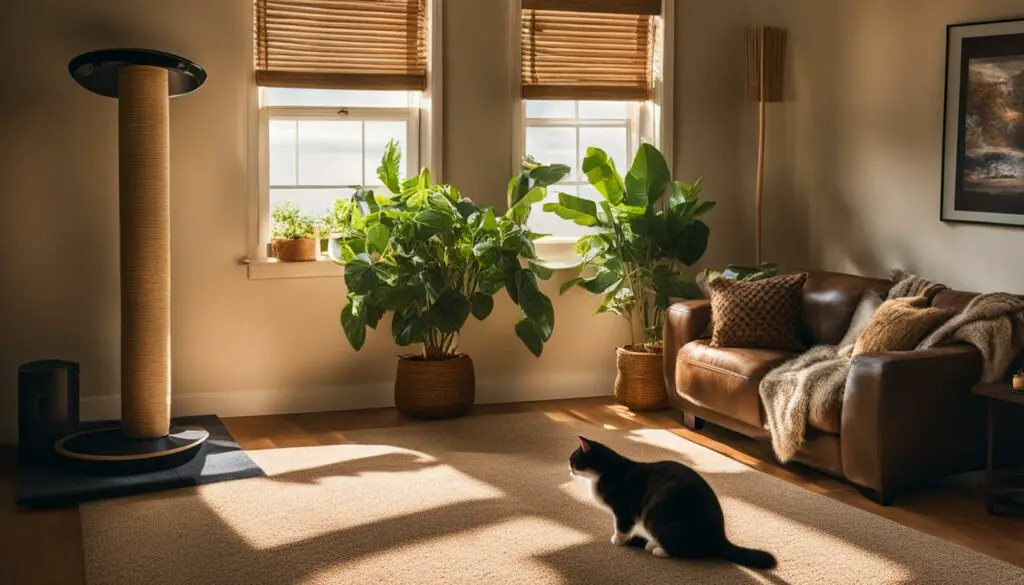Leaving your cat for an extended period can be a daunting task, but with proper care and preparation, you can ensure their safety and well-being. In this comprehensive guide, we will explore different options for caring for your cat while you’re away for two weeks, including long-term cat care, cat sitting services, and cat boarding options.
Key Takeaways:
- Plan ahead and consider your cat’s individual needs when deciding on the best care option for them.
- Automatic pet feeders and multiple water dispensers can help ensure your cat is fed and hydrated during your absence.
- Take steps to cat-proof your home and create a safe environment for your cat.
- Provide entertainment and stimulation for your cat through toys, a cat tree, and interactive videos.
- Consider hiring a professional cat sitter or utilizing cat boarding facilities for personalized care.
How to Feed Cats When Leaving Them for 2 Weeks
When leaving your cat for two weeks, it is essential to ensure they have access to fresh food and water. Consider investing in an automatic pet feeder that can dispense predetermined portions of food on a set schedule. This will ensure your cat is fed even when you’re not there to feed them manually. Additionally, make sure to leave multiple water dispensers to ensure your cat has access to fresh drinking water throughout the day.
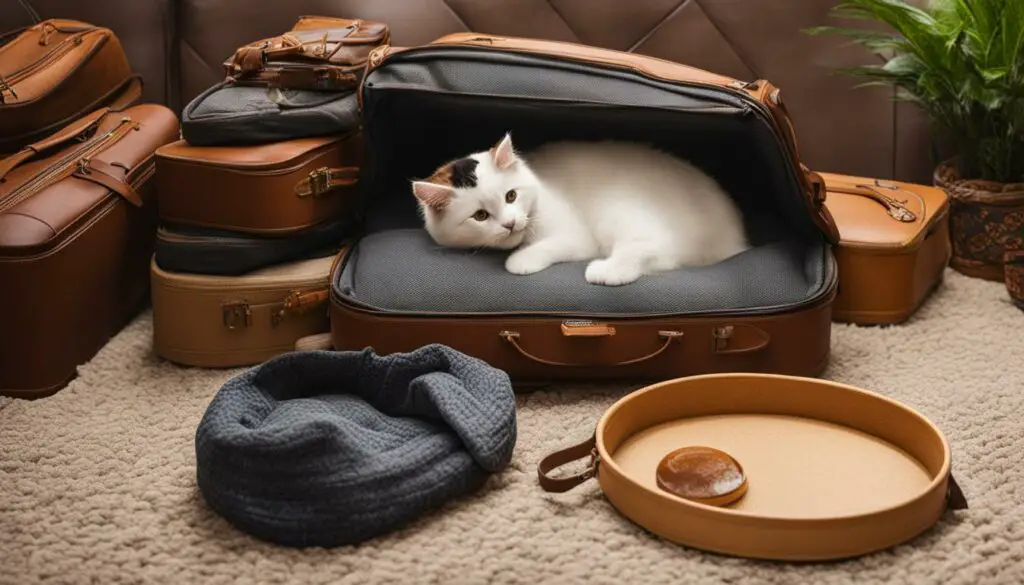
| Feeding Tips | Benefits |
|---|---|
| Invest in an automatic pet feeder | – Ensures your cat is fed on schedule |
| Pre-portion the food | – Helps prevent overeating and obesity |
| Leave multiple water dispensers | – Ensures your cat stays hydrated |
| Include a variety of dry and wet food | – Provides nutritional balance |
| Consult with your veterinarian | – Get personalized advice on your cat’s dietary needs |
By utilizing an automatic pet feeder and ensuring access to fresh water, you can have peace of mind knowing that your cat’s basic nutritional needs are met while you’re away. Remember to consult with your veterinarian for specific feeding recommendations based on your cat’s age, breed, and health conditions. With proper planning, you can ensure that your cat stays healthy and well-nourished during your absence.
Preparing Your Home for Your Cat’s 2-Week Absence
Before leaving your cat for two weeks, it is important to take the necessary steps to cat-proof your home and ensure their safety. By securing potential hazards and removing any dangers, you can have peace of mind knowing that your furry friend will be protected while you’re away.
Securing Electrical Cords
One of the most common household hazards for cats is electrical cords. These tempting items can be a source of great danger if your cat decides to chew on them. To prevent accidents and potential electrical shocks, secure electrical cords by hiding them behind furniture, using cord protectors, or taping them to the baseboards. This will keep them out of your cat’s reach and reduce the risk of injury.
Removing Accessible Lightbulbs
If your cat loves to play and explore, it’s essential to remove or secure any accessible lightbulbs to prevent accidents. Cats can easily knock over lamps, causing the bulb to break and potentially harm them. Consider removing lightbulbs from floor lamps or placing them out of reach on higher surfaces. This simple precaution will help keep your cat safe and prevent any mishaps in your absence.
By taking these simple cat-proofing measures, you can create a safe and secure environment for your cat during their two-week absence. This will give you peace of mind and ensure that your furry friend remains protected and out of harm’s way until your return.
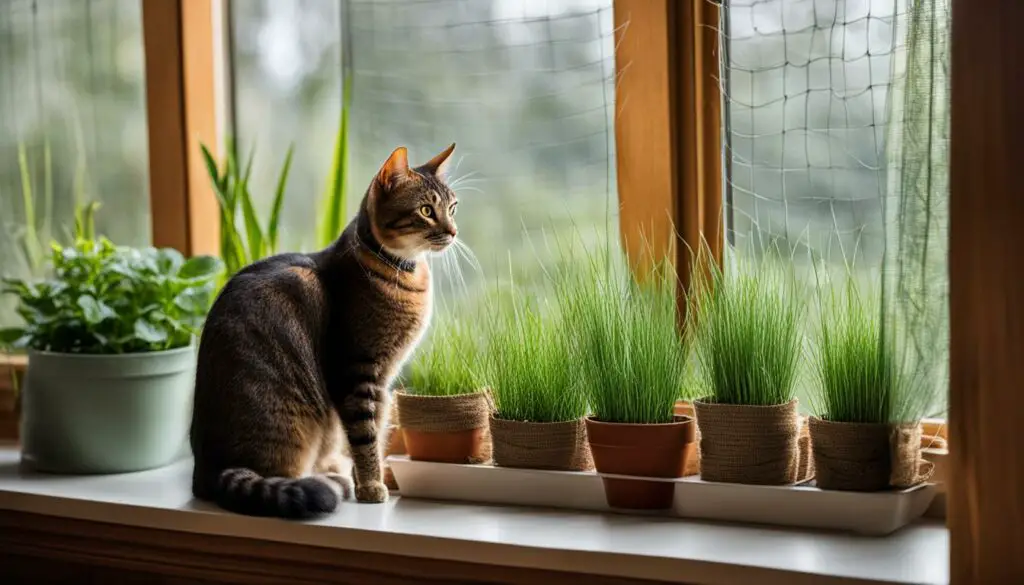
Providing Entertainment for Your Cat While You’re Away
Keeping your cat entertained and stimulated is crucial when leaving them for two weeks. Cats are naturally curious and playful animals, and providing them with activities and toys can help prevent boredom and anxiety. Here are some ideas to keep your feline friend entertained while you’re away:
Cat Toys
Cat toys are a great way to keep your cat engaged and mentally stimulated. Leave out their favorite toys, such as interactive puzzle toys or catnip-filled stuffed animals. These toys can provide entertainment and exercise for your cat, helping to keep them happy and content during your absence.
Cat Tree
A cat tree is an excellent addition to your home, especially when you’re away. It provides vertical space for your cat to climb, scratch, and observe their surroundings. Place the cat tree near a window so your cat can enjoy watching birds and other outdoor activities, which can be both entertaining and stimulating for them.
TV for Cats
Believe it or not, some cats enjoy watching television. Leave a TV on or stream cat-focused videos to provide visual stimulation for your cat. There are even channels specifically designed for cats, featuring moving objects, birds, and nature scenes that can captivate your feline friend’s attention.
Remember, when providing entertainment for your cat, it’s important to stick to familiar toys and avoid introducing new ones. New toys may cause stress or pose a hazard to your cat while you’re away. By incorporating these ideas into your cat’s routine, you can help keep them mentally stimulated and entertained during your two-week absence.

Hiring a Professional Cat Sitter or Pet Sitter
Leaving your cat for two weeks can be a challenging experience, especially if you’re uncomfortable leaving them alone or prefer them to be in their own environment. In such cases, hiring a professional cat sitter or pet sitter can provide the care and companionship your cat needs.
A professional cat sitter can visit your home daily to check on your cat, provide food and water, and offer companionship. They can follow your instructions regarding feeding schedules, medication, and any other specific requirements your cat may have. Hiring a cat sitter ensures that your cat receives personalized attention and care while you’re away.
When choosing a professional cat sitter, it’s essential to thoroughly vet potential candidates. Request references and read reviews from previous clients to ensure they have a track record of reliable and trustworthy service. Additionally, consider checking for any police clearance or background checks that may be necessary for your peace of mind.

A professional cat sitter can provide a stress-free alternative to traditional boarding options, allowing your cat to remain in the comfort of their own home. It’s important to discuss your expectations and requirements with the cat sitter beforehand, ensuring that both parties are clear on the responsibilities and schedule.
Benefits of hiring a professional cat sitter:
- Personalized care and attention for your cat
- Reduced stress for your cat by allowing them to remain in their familiar environment
- Daily visits to check on your cat’s well-being and provide necessary care
- Flexibility in following your cat’s routine and specific care instructions
- Regular updates and communication to keep you informed about your cat’s well-being
By hiring a professional cat sitter, you can have peace of mind knowing that your beloved feline companion is receiving the care and attention they deserve while you’re away.
Boarding Options for Cats During Extended Absences
When leaving your cat for two weeks, you may find that boarding options provide a safe and comfortable environment for your furry friend. Cat boarding facilities are specifically designed to cater to the needs of cats during extended absences. These facilities offer personalized care, ensuring that your cat receives the attention and care they deserve.
A reputable cat boarding facility will adhere to your cat’s feeding and playtime schedule, ensuring that they maintain their routine even while you’re away. You can also bring familiar items from home, such as their favorite blanket or toy, to make your cat feel more comfortable in their temporary surroundings.
Boarding facilities provide a controlled environment, minimizing the risk of your cat escaping or encountering any potential hazards. Trained staff members monitor the cats to ensure their safety and well-being. Additionally, boarding facilities often have strict vaccination requirements, ensuring that all cats in their care are healthy and protected against common diseases.
| Benefits of Cat Boarding Facilities | Considerations for Choosing a Boarding Facility |
|---|---|
|
|
Choosing the right boarding facility is crucial to ensure your cat’s well-being. Research different facilities in your area, read reviews, and visit the facility to assess its cleanliness and the qualifications of the staff members. It’s also important to inquire about the security measures in place and the size of the facility in relation to the number of cats they can accommodate.
Preparing Your Cat for Your Absence
Cats can experience separation anxiety when their owners are away for an extended period. To help ease this anxiety, it’s important to prepare your cat for your absence before you leave. Establishing a routine and gradually adjusting your cat to periods of alone time can make the transition smoother and less stressful for your furry friend.
Establishing a Routine
Start by gradually increasing the amount of time your cat spends alone. Begin with short periods and gradually extend them over time. This will help your cat get used to being alone and build their confidence. During these alone times, provide engaging toys and interactive activities to keep your cat stimulated and entertained. This will help redirect their focus and alleviate boredom.
Another important aspect of establishing a routine is maintaining consistent feeding and playtime schedules. Feed your cat at the same time each day and make sure to allocate time for play and exercise. This will help create a sense of predictability and stability in your cat’s daily life, even in your absence.
Using Familiar Scents
Leaving familiar scents around the house can provide comfort to your cat while you’re away. Unwashed clothing, blankets, or bedding that carry your scent can help reduce anxiety and make your cat feel secure. Place these items in areas where your cat likes to relax or sleep, such as their favorite resting spots or near their bed.
Calming Pheromones
Pheromone sprays or diffusers designed specifically for cats can be effective in reducing anxiety and stress. These products mimic natural feline pheromones, creating a soothing environment for your cat. Place the diffusers in rooms where your cat spends the most time or use the sprays on bedding and furniture to create a calming atmosphere.
Conclusion
Preparing your cat for your absence is essential to help them cope with separation anxiety. By establishing a routine, using familiar scents, and incorporating calming pheromones, you can create a positive and comforting environment for your cat while you’re away. Remember to gradually introduce alone time and provide stimulating activities to keep them engaged. With proper preparation, you can help ensure that your cat remains calm and content during your absence.

Creating a Safe and Comfortable Environment for Your Cat
When leaving your cat for two weeks, it’s crucial to create a safe and comfortable environment for them. By taking a few simple steps, you can ensure your cat’s well-being while you’re away.
Cat-Proofing Your Home
Before you leave, cat-proof your home to eliminate any potential hazards. Secure electrical cords and remove any toxic plants or cleaning products that could be harmful to your furry friend. Wrap cords and cables in protective coverings or hide them out of your cat’s reach. Doing so will help prevent any accidents or injuries while you’re away.
Temperature Control
It’s important to maintain a comfortable temperature in your home for your cat. Consider the weather conditions during your absence and make any necessary adjustments. If it’s hot, ensure your cat has access to a cool area and leave fans or open windows for proper ventilation. If it’s cold, provide adequate heating and cozy spots for your cat to curl up. Monitoring the temperature will help keep your cat safe and comfortable throughout their time alone.
Providing Comfort and Security
Leaving your scent behind can provide comfort and reassurance for your cat while you’re away. Leave unwashed clothing or bedding with your scent on it in their favorite spots. This familiar scent will help reduce anxiety and make your cat feel more secure in their environment. Additionally, consider using synthetic pheromones such as sprays or diffusers to create a calming atmosphere in your absence.
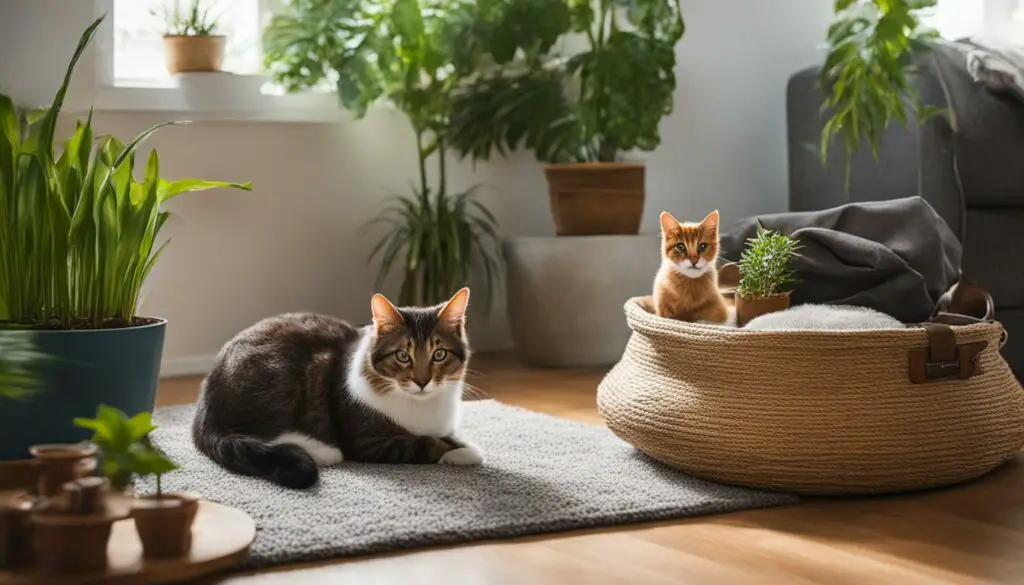
| Benefits of Cat-Proofing | Precautions for Temperature Control | Tips for Providing Comfort and Security |
|---|---|---|
| 1. Protects your cat from potential hazards 2. Reduces the risk of accidents or injuries 3. Peace of mind knowing your cat is safe |
1. Monitor weather conditions 2. Adjust temperature settings accordingly 3. Provide additional heating or cooling as needed |
1. Leave unwashed clothing or bedding with your scent 2. Use synthetic pheromones to create a calming environment 3. Establish a routine and gradual separation before you leave |
By implementing these measures, you can create a safe and comfortable environment for your cat during your two-week absence. Cat-proofing your home, maintaining appropriate temperatures, and providing comfort and security will ensure your cat’s well-being and peace of mind for you as a pet owner.
Communicating with Your Cat While You’re Away
Leaving your cat for two weeks can be challenging, but there are ways to stay connected with them even when you’re not physically present. One option is to use pet cameras that allow you to monitor your cat’s activities and provide a sense of reassurance. These cameras often come with two-way audio, enabling you to talk to your cat and let them hear your voice, which can help alleviate their anxiety and provide comfort.
Some pet cameras also offer interactive features such as built-in laser pointers or treat dispensers. This allows you to engage in playtime with your cat remotely and provide them with mental and physical stimulation. Whether it’s chasing a laser beam or receiving a tasty treat, these interactive toys can help keep your cat entertained and reduce any potential loneliness they may feel.
Using pet cameras to communicate with my cat while I’m away has made a world of difference. I can check in on her, talk to her, and even play with her using the treat dispenser. It helps us maintain our bond and gives me peace of mind knowing she’s doing well.”
– Cat owner
While pet cameras are a great way to stay connected with your cat, it’s important to note that they should not replace daily human interaction. Cats still need physical affection and companionship. So, make sure to arrange for a trusted friend, family member, or professional cat sitter to spend time with your cat in person, even if it’s just for a short visit each day.
| Advantages of Pet Cameras | Disadvantages of Pet Cameras |
|---|---|
|
|
Overall, pet cameras can be a valuable tool for staying connected with your cat while you’re away. They provide a sense of comfort and allow you to interact with your furry friend even when you can’t be there in person. Just remember to use them in conjunction with regular human interaction to ensure your cat’s emotional well-being.

Maintaining Your Cat’s Health and Wellness
Ensuring your cat’s health and wellness is essential when leaving them for two weeks. Before your departure, schedule a visit to the veterinarian to ensure your cat is up to date on vaccinations and to address any potential health concerns. This will give you peace of mind knowing that your cat is in good health and ready for your absence.
If your cat requires medication, make arrangements with your veterinarian or a trusted pet sitter to ensure they receive their medication as prescribed while you’re away. Provide clear instructions on dosage and administration, as well as contact information for the veterinarian in case of any emergencies or questions.
It’s also important to maintain good hygiene while you’re away. Ensure that your cat’s litter box is clean and accessible, and consider leaving extra litter and waste disposal bags for your cat sitter or boarding facility. A clean environment will help prevent any potential health issues and keep your cat comfortable during your absence.

Table: Common Medications and Dosages
| Medication | Dosage |
|---|---|
| Flea and tick prevention | As directed by the veterinarian |
| Heartworm prevention | Once a month, as directed by the veterinarian |
| Antibiotics | As prescribed by the veterinarian |
| Pain medication | As directed by the veterinarian |
Remember to inform your veterinarian about your upcoming absence and ask for any additional recommendations specific to your cat’s health needs.
Preparing for Your Return and Reunion with Your Cat
As your vacation draws to a close, it’s important to plan for a smooth transition when you return home and reunite with your beloved feline friend. Taking a few simple steps can help ease any potential stress or anxiety caused by your absence.
Upon your return, it’s essential to gradually reintroduce yourself to your cat, allowing them to approach you at their own pace. Avoid overwhelming them with too much attention right away. Instead, create a calm and inviting environment for them to feel comfortable in.
Resuming your cat’s regular feeding schedule is crucial in reestablishing routine and normalcy. Stick to the same type and brand of food your cat is used to and avoid introducing any new dietary changes during this time. Providing plenty of attention and affection will also go a long way in reassuring your cat of your love and care.
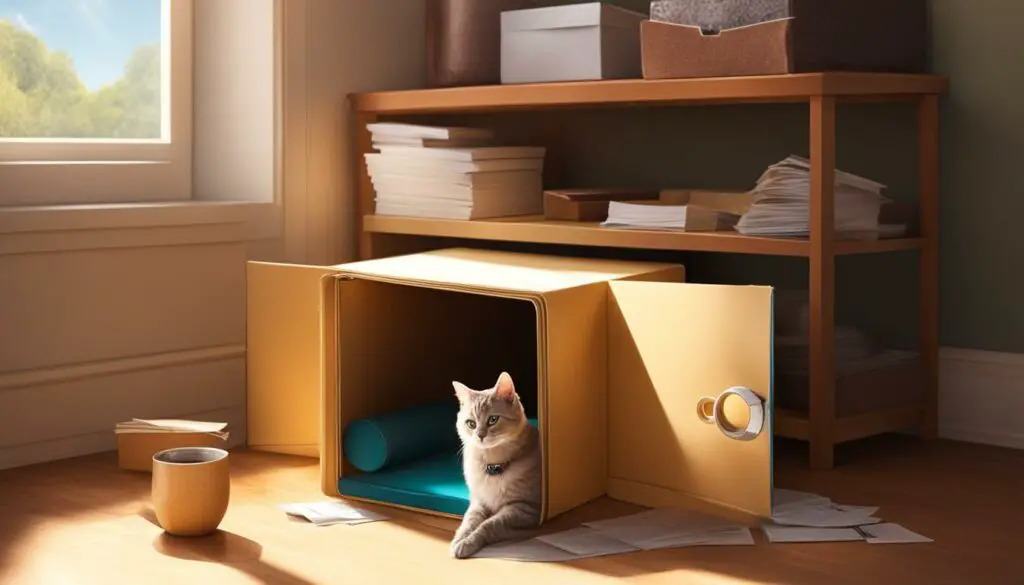
Handling Unexpected Situations and Emergencies
When leaving your cat for two weeks, it’s important to be prepared for any unexpected situations or emergencies that may arise. By taking the necessary precautions and providing the right information, you can ensure your cat’s safety and well-being even when you’re not there.
In case of an emergency, it’s essential to provide your cat sitter or boarding facility with contact information for both you and your veterinarian. Leave clear instructions on how to handle any medical emergencies that may arise, including any specific medications your cat may need. Additionally, make sure your emergency contact is available and willing to assist in case of any unforeseen circumstances.
Creating an emergency plan can help alleviate any concerns you may have about leaving your cat for an extended period. Keep a list of emergency vet clinics in your area, along with their contact information, easily accessible. This way, you or your cat sitter can quickly locate the nearest veterinary facility in case of an emergency.
Another important consideration is to have all your cat’s important documents, such as vaccination records, readily available in case they are needed while you’re away. Keep these documents in a secure and easily accessible location, ensuring that anyone caring for your cat knows where to find them if necessary.
“By taking the necessary precautions and providing the right information, you can ensure your cat’s safety and well-being even when you’re not there.”
| Emergency Contacts | Veterinarian Information |
|---|---|
| Emergency Contact Name: [Your Emergency Contact’s Name] | Veterinarian Name: [Your Veterinarian’s Name] |
| Emergency Contact Phone: [Your Emergency Contact’s Phone Number] | Veterinarian Phone: [Your Veterinarian’s Phone Number] |
| Emergency Contact Email: [Your Emergency Contact’s Email] | Veterinarian Email: [Your Veterinarian’s Email] |
| Emergency Contact Address: [Your Emergency Contact’s Address] | Veterinarian Address: [Your Veterinarian’s Address] |
By being prepared and providing the necessary information, you can ensure that your cat receives the proper care and attention required in case of an emergency. With a well-thought-out plan in place, you can have peace of mind knowing that your cat is in good hands even when you’re away.

Tips for Leaving Cats for 2 Weeks Successfully
Leaving your beloved cat for two weeks can be a challenging experience, but with careful planning and preparation, you can ensure that your furry friend remains safe, happy, and well-cared for in your absence. Here are some essential tips to help you navigate this extended period of separation and provide the best care possible for your cat:
1. Secure a Reliable Caregiver or Boarding Facility
If hiring a professional cat sitter or utilizing a reputable boarding facility, be sure to thoroughly vet their credentials, check references, and discuss your cat’s specific needs and routines. This will help ensure that your cat receives personalized attention, proper feeding, and a comfortable environment while you’re away.
2. Establish a Routine Before You Leave
To minimize anxiety and stress for your cat, gradually introduce periods of alone time and establish a consistent routine before your departure. This will help your cat adjust to your absence and provide a sense of security and stability.
3. Provide Enrichment and Stimulation
Leave your cat with plenty of toys, scratching posts, and interactive feeding puzzles to keep them mentally and physically engaged during your absence. Consider using cat-friendly pheromone sprays or diffusers to create a calm and comforting environment.
4. Regular Communication and Monitoring
Stay connected with your cat by utilizing technology such as pet cameras or two-way audio devices. This allows you to check in on your cat, offer reassurance, and even engage in interactive play sessions from a distance.
Remember, every cat is unique, so consider their individual needs and preferences when implementing these tips. With careful planning and attention to detail, you can ensure a successful and worry-free experience when leaving your cat for two weeks.
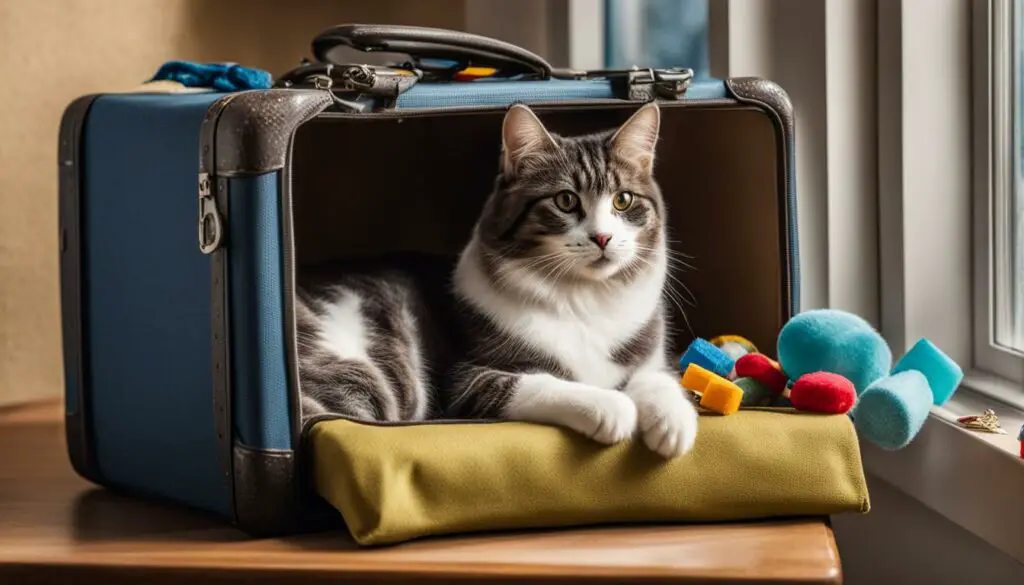
| Tips for Leaving Cats for 2 Weeks Successfully |
|---|
| Secure a Reliable Caregiver or Boarding Facility |
| Establish a Routine Before You Leave |
| Provide Enrichment and Stimulation |
| Regular Communication and Monitoring |
Additional Considerations and Resources for Leaving Cats for 2 Weeks
When preparing to leave your cat for a two-week absence, it’s important to consider various factors to ensure their well-being and happiness while you’re away. In addition to the tips and guidelines provided earlier in this guide, there are additional resources available to help you navigate and address any concerns you may have.
One valuable resource is reputable websites that offer comprehensive information on cat care during extended absences. These websites often provide detailed guides, articles, and tips from experienced professionals and cat owners who have faced similar situations. Take the time to explore these websites and gather insights that may be relevant to your specific circumstances.
Books on long-term cat care can also be a valuable resource. Look for books written by reputable authors who specialize in feline care. These books can provide in-depth information on topics such as cat behavior, separation anxiety, and how to create a safe and comfortable environment for your cat while you’re away.
| Title | Description | Author |
|---|---|---|
| Leaving Cats for 2 Weeks: A Comprehensive Guide | This book offers a step-by-step guide on how to prepare and care for your cat during a two-week absence. | Jennifer Thompson |
| Long-Term Cat Care: Tips and Strategies | Learn how to address common challenges and ensure your cat’s well-being during extended periods of absence. | Michael Davis |
| Cat Sitters and Boarding Facilities: Finding the Right Fit | This book provides insights and guidance on how to choose the best cat sitter or boarding facility for your cat’s needs. | Emily Walsh |
Lastly, consulting with your veterinarian can provide personalized advice and recommendations tailored to your cat’s specific needs. Veterinarians are experienced professionals who can offer insights on managing any health concerns, addressing separation anxiety, and ensuring your cat’s overall well-being. They may also be able to recommend local resources, such as reputable cat boarding facilities or professional cat sitters.
Remember, leaving your cat for two weeks can be a stressful experience for both you and your furry friend. By utilizing additional resources and seeking expert guidance, you can feel more confident in your preparations and provide the best possible care for your cat during your absence.
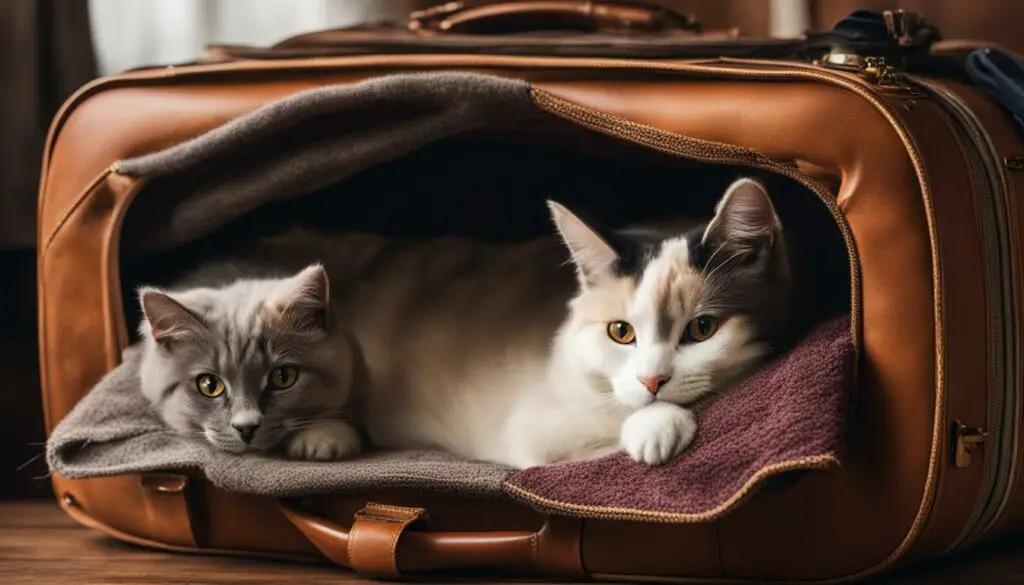
Additional Resources:
Conclusion
Leaving your cat for two weeks can be a challenging experience, but with proper planning and care, you can ensure their well-being and happiness. When considering long-term cat care, it’s essential to explore different options that suit your cat’s individual needs. Whether it’s hiring a professional cat sitter, opting for a cat boarding facility, or utilizing technology to stay connected, there are various ways to ensure your cat is well-cared for while you’re away.
Remember to prepare your cat’s environment by cat-proofing your home and maintaining a comfortable temperature. Providing entertainment and stimulation through their favorite toys and a cat tree near a window can help keep them engaged. Additionally, ensuring their health and wellness needs are met by scheduling a visit to the veterinarian and making arrangements for medication is crucial.
Lastly, plan for a smooth reunion by gradually reintroducing yourself to your cat, reestablishing their routine, and showering them with attention and affection. Handling unexpected situations and emergencies requires leaving appropriate contact information and documents, giving you peace of mind while you’re away.
By following these tips and guidelines, you can leave your cat for two weeks with confidence, knowing they are in good hands. Remember, proper care and preparation are key to ensuring your beloved feline companion remains safe, happy, and well-cared for during your absence.
FAQ
How can I ensure my cat is fed while I’m away for two weeks?
Consider investing in an automatic pet feeder that can dispense predetermined portions of food on a set schedule. This will ensure your cat is fed even when you’re not there to feed them manually.
How do I cat-proof my home before leaving my cat for two weeks?
Secure electrical cords and remove any unnecessary cords to prevent your cat from chewing on them. Consider removing lightbulbs or placing them out of reach to prevent accidents if your cat plays and knocks over lamps.
How can I keep my cat entertained while I’m away for two weeks?
Leave out their favorite toys, such as soft toys and ping-pong balls. Consider placing a cat tree near a window so your cat can enjoy watching the outside world. If your cat enjoys watching TV, leave a TV on or stream cat-focused videos to provide visual stimulation.
What are the options for cat care while I’m away for two weeks?
You can hire a professional cat sitter or pet sitter to visit your home daily and provide care, or you can consider boarding options for cats at reputable cat boarding facilities.
How can I help ease my cat’s separation anxiety when I’m away for two weeks?
Establish a routine and gradually adjust your cat to periods of alone time before your departure. Leave familiar scents, such as unwashed clothing, to provide comfort. Consider using pheromone sprays or diffusers designed to calm cats and reduce anxiety.
How do I create a safe and comfortable environment for my cat while I’m away for two weeks?
Secure any potential hazards, such as toxic plants and cleaning products. Maintain a comfortable temperature in your home. If necessary, set up fans or provide heating to ensure your cat is neither too hot nor too cold.
How can I stay connected with my cat while I’m away?
Use pet cameras that allow you to monitor their activities and interact with them through two-way audio. Some pet cameras also have interactive features that enable you to play with your cat remotely using built-in laser pointers or treat dispensers.
What should I do to ensure my cat’s health and wellness while I’m away for two weeks?
Schedule a visit to the veterinarian to ensure your cat is up to date on vaccinations and to address any potential health concerns. Make arrangements with your veterinarian or a trusted pet sitter to ensure they receive any necessary medication while you’re away.
How should I plan for my return and reunion with my cat after being away for two weeks?
Gradually reintroduce yourself to your cat, allowing them to approach you at their own pace. Resume their regular feeding schedule and provide plenty of attention and affection to help ease any potential stress or anxiety.
How can I prepare for unexpected situations or emergencies while I’m away?
Provide an emergency contact for your cat sitter or boarding facility. Leave detailed instructions for handling medical emergencies and keep important documents and medical records easily accessible in case they are needed.
What are some tips for successfully leaving my cat for two weeks?
Prepare your cat’s environment, provide entertainment and stimulation, hire a professional cat sitter or consider boarding options, and stay connected with your cat using technology. By taking these steps, you can ensure that your cat remains safe, happy, and well-cared for during your absence.
Where can I find additional resources for leaving my cat for two weeks?
Consult reputable websites, books, or even consult with your veterinarian for personalized advice and recommendations. Gathering information and consulting experts will help ensure you have all the necessary knowledge and resources for a successful experience.

